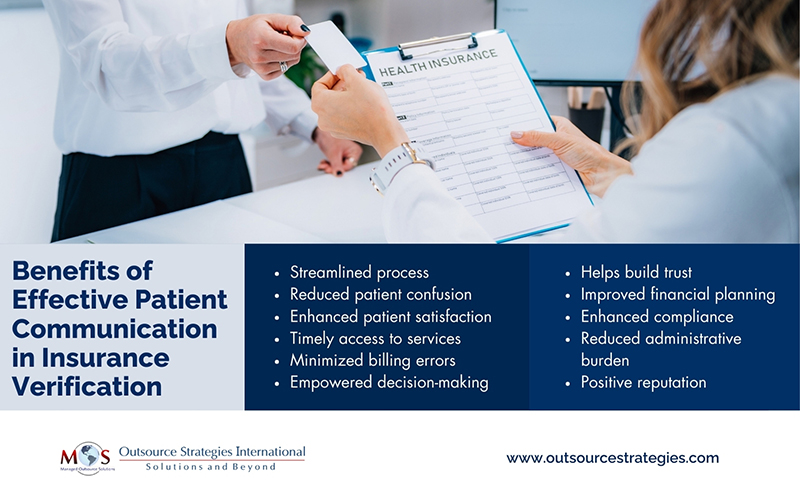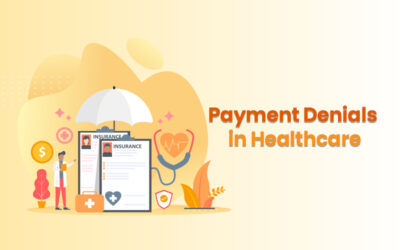Effective communication is crucial in healthcare, especially when it comes to insurance verification. Insurance plays a significant role in determining the coverage and financial responsibilities of patients. Verification of patient benefits involves a series of steps to confirm a patient’s coverage, ensuring a seamless financial process for both providers and individuals seeking medical care.
Clear and concise communication about insurance eligibility verification helps patients understand their benefits, potential costs, and the necessary steps they need to take. Effectively communicating insurance verification details to patients also involves transparently explaining insurance terms, coverage limitations, and financial responsibilities. It is critical for verification specialists to carefully discuss insurance policies, ensuring patients understand aspects like deductibles, co-pays, and out-of-pocket expenses.

Advantages of Effective Patient Communication in Insurance Eligibility Verification
The Importance of Effective Communication in Patient Eligibility Verification
- Informed decision-making: Transparent communication provides patients with a clear understanding of their insurance coverage, enabling them to make informed decisions about their healthcare. This includes understanding details about deductibles, co-pays, in-network providers, and any potential out-of-pocket expenses.
- Financial empowerment: By clearly explaining insurance terms and financial responsibilities, patients are able to navigate the financial aspects of their healthcare confidently. This can alleviate stress and enable a sense of control over their medical expenses.
- Preventing surprises: Transparent communication helps in preventing unexpected financial surprises. Patients who are well-informed about their insurance coverage are less likely to be caught off guard by unexpected bills, contributing to a more positive patient experience.
- Building trust and satisfaction: Open and honest communication fosters trust between healthcare providers and patients. When patients feel that their concerns and questions are addressed, satisfaction levels increase, strengthening the patient-provider relationship.
Best Practices for Patient-centric Communication:
Let’s check out some best practices for patient-centric communication during insurance verification:
Use clear and simple language: Insurance terms and jargon can be complex and overwhelming for patients. Avoid using technical terms when possible. Instead, use plain and simple language to explain insurance concepts, such as deductibles, co-pays, and out-of-pocket maximums. Break down complex information into smaller, understandable pieces, and provide examples to illustrate key points.
Patient education materials: Provide patients with written materials that explain insurance terms and the verification process. This allows them to review the information at their own pace. Also, incorporate visual aids, such as charts or infographics, to enhance understanding. Visual representations can simplify complex concepts and make the information more accessible.
Use technology: Use digital tools to enhance communication about insurance eligibility verification. Implement patient portals or secure messaging systems to share insurance-related information securely. Provide online resources or links to reputable websites where patients can find additional information about insurance terms and coverage.
Discuss financial responsibilities: Once verification is complete, provide patients with a clear explanation of their coverage and any limitations. Inform them about covered services, potential co-pays or deductibles, and any exclusions or restrictions. If certain services are not covered, explain the reasons and explore alternative options if available.
Interactive sessions: Encourage questions and engage in interactive sessions. Hosting Q&A sessions or one-on-one consultations can address individual concerns and ensure that patients feel heard. Establish a dedicated support system for patients to reach out with questions. Providing contact information for a knowledgeable staff member who can assist with insurance-related queries adds an extra layer of support.
Continual communication: Maintain an ongoing dialogue with patients throughout their healthcare journey. Regularly update them on any changes in coverage, financial responsibilities, or additional information that may impact their healthcare decisions. Train your staff to be empathetic, patient, and approachable. Encourage them to actively listen to patients’ concerns and address them promptly. When patients feel comfortable, they are more likely to engage in conversations about insurance verification.
Confirm insurance coverage in advance: To avoid surprises, proactively verify patients’ insurance coverage before their scheduled appointments. Communicate with patients regarding the importance of providing accurate insurance information during the registration process. Inform them about the need to update any changes in their insurance coverage promptly.
Staff training: Invest in training your staff on effective communication techniques. Ensure they are knowledgeable about insurance processes, terms, and common issues that patients may face. They should be able to answer basic insurance questions and direct patients to appropriate resources when needed.
Effective communication during the insurance verification process is critical for ensuring that patients are well-informed, financially empowered, and confident in their healthcare choices. At OSI, our patient eligibility verification team implements patient-centric communication practices, so that your practice can contribute to a positive and collaborative patient experience.






